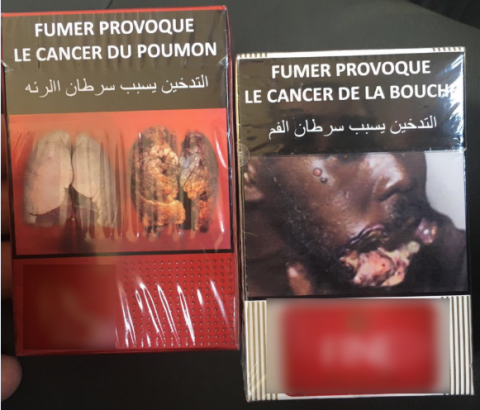
Blogpost: Tobacco taxation in-country technical assistance mission in Chad - 9 April 2019

Chad ratified the Framework Convention on Tobacco Control (FCTC) in 2006. Following the ratification, it enacted tobacco control legislation in 2010, proving its willingness to take action to curb the tobacco epidemic. Although Chad has made its commitment to tobacco control clear by implementing large pictorial health warnings on cigarette packs, smoke free places and a broad ban on tobacco advertising, promotion and sponsorship, there is much scope for improvement in the area of tobacco taxation.
The market for cigarettes in Chad is dominated by a lone national manufacturing company “Manufacture des Cigarettes du Tchad” (MCT) producing popular brand cigarettes such as Fine, News and PS. With approximately 99% of cigarettes produces domestically (2017 statistics from MCT)[1], the imported cigarettes constitute a small proportion of the taxation revenues as most imported cigarettes are off the books. The average retail price of domestic cigarettes in Chad is 650 francs while imported cigarettes like Marlboro cost 1000 francs.
In 2018, the tax component represented less than 24% of the retail price. Taxes on tobacco products in Chad include: (1) the VAT rate levied at 18%, (2) an ad valorem tax, levied at a rate of rate of 25% of the CIF value for imported cigarettes or the ex-works value of domestically produced cigarettes, (3) a specific tax for environmental protection of 5 francs per pack, (4) an anti-retro-viral tax of 2% of the CIF or ex works value and (5) a specific tax of 10 francs per pack for the Youth and Sports Ministry department. Since Chad belongs to the CEMAC (Central African Economic and Monetary Community) zone, it collects the Community Integration Levy (TCI), the Organization for Harmonization of Business Laws in Africa (OHADA) levy, and the Community Integration Contribution (CCI) on all tobacco products. These charges amount to 1.45% of import value. In addition, custom duties of 30% are levied on cigarettes imported from outside the CEMAC region.
In response to a request for technical assistance on its tobacco taxation policy, the Knowledge Hub on Tobacco Taxation and Illicit Trade at the University of Cape Town conducted an in-country technical assistance mission in Chad during November 2018. The purpose of the mission was to sensitize relevant stakeholders on the benefits of increasing excise taxes on tobacco products and to present simulation results of the impact of an increase in taxes on cigarettes in Chad within the framework of the proposed 2019 Finance Law.
During the mission, we presented the results from a number of tax simulation exercises, using the Tobacco Excise Tax Simulation (TETSIM) model, to a host of stakeholders including: the finance committee at the National Assembly; the National Committee for Tobacco Control (Comité National de Lutte anti-Tabac), individuals working in the tax and customs departments, members of the civil society and advocates involved in tobacco control.
Based on the results of the simulation model, the technical mission recommended that Chad implement a new specific excise tax of 100 francs per cigarette pack. This recommendation was accepted by the government of Chad. Chad announced the implementation of a specific excise tax of 100 francs on all cigarette packs in the 2019 Finance Law with effect from 01 January 2019. Furthermore, it was announced that the additional tax revenue from this new tax will be earmarked for the promotion of public health. Our modelling exercise predicts that this change would decrease the consumption by approximatively 13% and generate extra government revenue of 4 billion francs per year.
These improvements in its tobacco taxation policy are a clear win-win situation for public health and government in Chad. The implementation of a specific tax will create a consumption shock that re-enforces the anti-tobacco agenda, and generates extra revenue for the government. In order to ensure that the government receives the full financial benefit of increased tobacco taxation, government will need to build capacity amongst its customs and excise authorities to identify and seize illegal (non-taxed) cigarettes at the border. Our estimates show that more than 23 million packets of imported cigarettes are smuggled across the borders yearly, amounting to annual loss of four billion francs to the government of Chad. In addition to capacity building, amongst border control agents, it was recommended that the Ministry of Health and the Customs Bureau collaborate to verify the lists of entities authorized to import tobacco products, and to monitor the quantities imported by each of these entities.
[1] Based on statistics from the custom office in Chad, 50,829,500 packets of cigarettes were produced domestically while 181,000 packets were imported in 2017.





